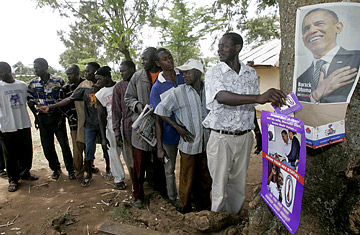
Villagers line up to cast a mock ballot next to a poster of Barack Obama in Kogelo, the town in Kenya where Obama's ancestors are from
Blood flowed as Election Day dawned in Barack Obama's ancestral village in western Kenya. The presidential candidate's half-brother Malik tied a bull to a tree, then hobbled it, and asked me to hold the beast's head to the ground as he drew a machete across its jugular. "Hold this guy down now," said Malik, 50, eyeing the animal's horns as blood poured from its throat like an open tap. "He could kill me now." After five minutes, the blood flow began to slow, and the fight went out of the animal, which stopped kicking and lay still, breathing heavily. "O.K., it's over," said Malik. "Fine animal too."
(See pictures of Barack Obama's family tree.)
The people of Kogelo may be celebrating what they expect will be the ascension of one of their own to the most powerful office in the world, but it's murder on their animals. Meat is highly prized in a poor community like Kogelo, and with cows and goats the main measure of wealth, most villages choose a vegetarian diet most of the time. The past few days, however, have witnessed a comparative bloodbath: More than 200 chickens disappeared into a giant pot whose contents will be served to all comers outside the village dispensary. Malik, inundated by more than 50 relatives from across Kenya and the world, has been getting through two goats a day, and now that the big day has arrived, he decided to step things up a notch by serving up two bulls. Scarcely had he dispatched the pair before he was driving to the nearby market of Ngiya to buy two more for tomorrow.
In the U.S., Obama's campaign cost hundreds of millions of dollars, and for his half-brother in Kenya, it has proved to be no less taxing. As well as feeding 50 people a day, he has had to buy a new television on which to watch the election and a generator to power it, and to ensure that the entire family is turned out in best Kenyan finery. In addition, he finds himself dealing with the fallout from his brother's fame, as villagers stop him on the street and ask for money. "These people think I'm suddenly a millionaire," said Malik as he made yet another withdrawal from a local bank. "They all want a piece."
At the livestock market in Ngiya, the cowherds parade their animals before Malik. "What I am trying to do is not make a spectacle," said Malik. "The price is based on how they perceive you. I am trying to portray a posture of disinterest." It's not working. A broad man who is well over 6 feet tall and is wearing a bright yellow-and-blue African print shirt, Malik towers over the animals and their owners in the center of the market. In the end, he buys two impressive looking animals for 17,000 Kenyan shillings each (around $220), well above the normal price. The implications of Barack Obama's rise will be discussed for years. But for Malik, one lesson is already clear: Don't buy a cow on the day your half-brother is expected to be elected President of the United States.
